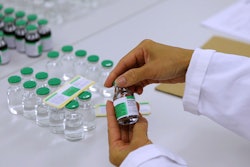
UPS Healthcare's clinical trial logistics company, Marken, will expand on a global level focused on cell and gene clinical trial. The advancement comes during a time crucial in the healthcare industry, as the pandemic pushes the need for medicine, drugs and other medicinal materials. Throughout 2022, Marken will open new locations, grow cold chain services and push packaging solutions and includes the addition of 100,000 square feet of GMP-compliant depot operations in Louisville, Ky. and Seol, South Korea.
Per PR Newswire:
Marken's ongoing and planned investments include:
- A new GMP depot facility in Kiev, Ukraine
- A new GDP depot facility in Osaka, Japan
- New locations in Nairobi, Kenya and Accra, Ghana
- Expansion of its kit assembly facility in Shanghai, China
- New liquid nitrogen (LN2) filling stations within each of its global cell and gene centers of excellence
- Infrastructure expansion at its facilities in Belgium, France, South Africa, India, Taiwan, China, and Singapore
- Packaging and technology enhancements for real-time location tracking and temperature monitoring of cell and gene therapy shipments
- In addition to GMP storage, Marken will be able to track highly sensitive cell and gene therapy, compassionate use, and early access program shipments from its Ukraine facility. This new control center, combined with the existing control center in Durham, NC, will enhance 24/7/365 global monitoring of all complex shipments, including cell and gene shipments.
"We are accelerating the expansion of our clinical supply chain network across all regions to provide increased flexibility and global access for our partners, including access in emerging markets like South Korea and Sub-Saharan Africa," said Ariette van Strien, president of Marken. "These investments are especially critical for cell and gene therapy developers, where we see increased innovation enabled by mRNA, CAR-T, and viral vectors. With the FDA expecting to approve 10 to 20 cell and gene therapy products per year by 2025, our industry-leading network is designed to simplify the transition from clinical trials to commercialization."



















